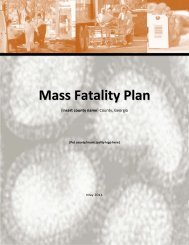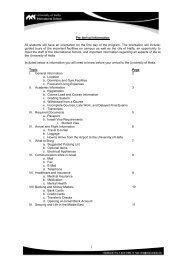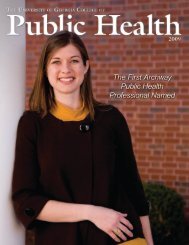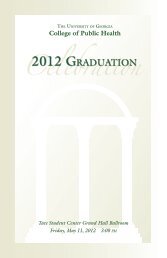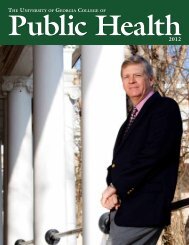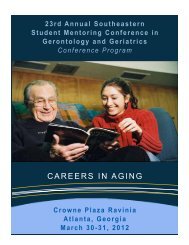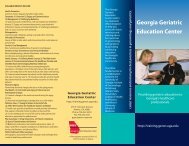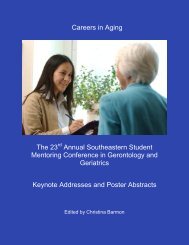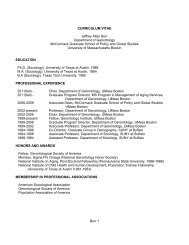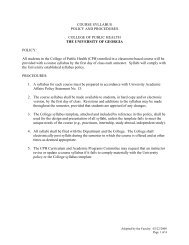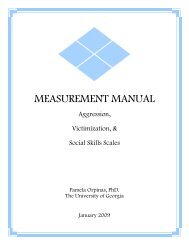Epidemiology and BiostatisticsDr. Claire Robb (right) metwith Dr. Martine Extermannand Dr. William Haley atM<strong>of</strong>fitt Cancer Center inTampa, Fla, to discuss hercontinuing research in thearea <strong>of</strong> cancer and aging.Life After Breast CancerThere’s no need for aging adults toresign themselves to illness. After all,aging is natural, but disease is not”, saysClaire Robb, assistant pr<strong>of</strong>essor <strong>of</strong> Epidemiologyin the Department <strong>of</strong> Epidemiologyand Biostatistics.“Sometimes illness is thought togo hand-in-hand with aging,” saysRobb. “It doesn’t, and it is importantfor health care pr<strong>of</strong>essionals workingwith older adults to distinguish the differencebetween normal age-relatedchanges that occur in the elderly andthose changes that are a direct result <strong>of</strong>illness and disease.”Robb’s mission is simple: “Drawsome attention to the plight <strong>of</strong> the oldercancer patient and survivor,” she says.Her initial interest in this field wasin the area <strong>of</strong> older breast cancer survivors.Although 70 percent <strong>of</strong> breastcancer cases occur in women age 65 orolder, some <strong>of</strong> the most aggressive casescan be found in young women—so thatdemographic has had much <strong>of</strong> the researchfocus. It’s only in the past decadethat researchers have started paying attentionto older cancer survivors, partlybecause there are simply more oldercancer survivors alive these days as cancertreatment has improved.Even though older breast cancersurvivors are living longer, they are notnecessarily living well, as Robb’s researchreveals.Robb co-authored two papers thatwere published in the Critical Reviewsin Oncology/Hematology journal lastApril: “Impact <strong>of</strong> Breast Cancer Survivorshipon Quality <strong>of</strong> Life in OlderWomen” and “Individual Differencesin Well-Being in Older Breast CancerSurvivors.” Working with principalinvestigator William E. Haley <strong>of</strong>the <strong>University</strong> <strong>of</strong> South Florida, Robbsurveyed 127 survivors who had beenpatients at the H. Lee M<strong>of</strong>fitt CancerCenter and Research Institute in Tampa,Fla., as well as a control group <strong>of</strong> 87cancer-free women. The cancer survivors,whose mean age was 78, were onaverage five years from initial diagnosiswithout recurrence—a benchmark <strong>of</strong>tenthought <strong>of</strong> as a sign that the patientis cancer-free.“We thought we might see a littlemore functional disability in the survivors,”says Robb. “We weren’t surewhat we’d find.”What Robb and her colleagues didfind was that, on the average, older patientsfare worse in physical function,general health and mental health.Part <strong>of</strong> that can be due to the factthat older women take a longer time torecover from the primary treatment—a10 <strong>College</strong> <strong>of</strong> <strong>Public</strong> <strong>Health</strong>
lumpectomy or mastectomy—followedby radiation therapy, chemotherapyor, more recently, hormonal therapy.While younger women treated forbreast cancer usually recover fully withintwo years, “It just takes older peoplelonger to recover,” says Robb.Some <strong>of</strong> this may be due to alessening <strong>of</strong> reserve capacity in olderadults, she explains. In other words,it takes older adults a longer time to“bounce back” from a physical assaulton the system than it does in youngeradults.Also, the women who were survivorsdid not report more depressionthan the control group, but did reportsignificantly less satisfaction in theirlives than their cancer-free counterparts.The ultimate goal <strong>of</strong> Robb’s researchis to design interventions andspecial therapies that will help womenrecover more fully, and bring the researchshe and colleagues have done ina cancer center into the community.“Everyone has a right to live theirlife the best they possibly can,” shesays.In the meantime, Robb continuesto research “the next frontier” in cancerpatient support: the community setting.In September, Robb brought MartineExtermann, the research director <strong>of</strong> theM<strong>of</strong>fitt Center’s Senior Adult OncologyProgram, to speak at the Cancer andAging Salon sponsored by the Institute<strong>of</strong> Gerontology. Robb also representedthe <strong>College</strong> <strong>of</strong> <strong>Public</strong> <strong>Health</strong> as a member<strong>of</strong> the planning committee—alongwith Georgia Comprehensive CancerPrevention and the Centers for DiseaseControl and Prevention—for the state’sfirst Cancer Survivorship Conference,held in Peachtree City, GA.Her inspiration is simple. “A greataffinity for courageous older adults—that’s what got me interested in this,”she says.—Mary Jessica HammesPalm Pilotsto HelpPeople QuitSmokingThere are lots <strong>of</strong> reasonswhy people smoke,and everyone knows it’s hardto quit. But if researchers can analyzepatterns <strong>of</strong> quitting and relapse, then bettertherapies can be created for smoking cessation.Enter Steve Rathbun, associate pr<strong>of</strong>essor <strong>of</strong> biostatistics,who is studying smokers’ habits using a new technology: PalmPilots. Test subjects record when they light up and can giveresponses in the moment regarding how they’re feeling, describetheir surroundings or note whether they’re alone. Datais collected while following subjects in their own environment.It’s called ecological momentary assessment data—real timeresponses, as opposed to vague memories recorded later.“One <strong>of</strong> the problems with previous studies is they weredone with paper surveys, where they asked smokers to recalltheir memories,” says Rathbun. “When you try to recall yourmood from two weeks ago, you may not remember correctly.”Patterns in the study are still emerging, but there havebeen a few observations already, some expected and somenot: Subjects tend to smoke when restless and alone; thewomen in the study are more likely to be affected by beingalone; the men, meanwhile, seem to be more affected by moodvariables.As a biostatistician, Rathbun’s job is to come up with a newmethodology to find unbiased results that can be mathematicallyproven valid. When he’s not doing that, Rathbun keepsbusy with an online course <strong>of</strong>fered in collaboration with the<strong>College</strong> <strong>of</strong> Pharmacy’s regulatory affairs department, teachingstudents the statistical principles and issues involved in clinicaltrials. The course was first <strong>of</strong>fered last summer.Rathbun is not new to collaboration. He <strong>of</strong>ten works withother departments on campus, an opportunity common inbiostatistician programs, he says: Grant proposals are morelikely to be funded with a statistician on board. And there arealways more collaborations on the horizon.“It’s a pretty exciting opportunity to be in on the groundfloor <strong>of</strong> a new college,” he says.—Mary Jessica HammesWinter <strong>2007</strong> 11



